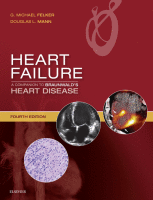Physical Address
304 North Cardinal St.
Dorchester Center, MA 02124

Depressed systolic function is a core manifestation in nearly half of all patients with heart failure (HF). The underlying mechanisms are many and include defects in sarcomere function (see Chapter 2 ), abnormal excitation-contraction coupling and calcium homeostasis, ion channel…

Natriuretic Peptides: Historical Background The discovery of natriuretic peptides (NPs) changed the classical paradigm of the heart as solely a pump and developed the novel concept of the heart as an endocrine organ. The current and potential applications of NPs…

Oxidative stress is increased in heart failure (HF), and experimental studies suggest that this contributes to structural and functional changes in the heart that are central to both cardiac dysfunction and disease progression. Reactive Oxygen Species and Antioxidant Systems (…

Although clinicians recognized the pathophysiological importance of inflammation in the heart as far back as 1669, the formal recognition that inflammatory mediators were activated in the setting of heart failure did not occur for another three centuries. Since the initial…

Normal and pathophysiological stresses result in increased myocardial demand that is met by a commensurate increase in cardiac adrenergic drive. To facilitate this increase, the neurotransmitter norepinephrine (NE) is released from adrenergic (sympathetic) nerve endings within the heart. Upon binding…

A Perspective on the Renin Angiotensin Aldosterone System Although Bright (1827) first associated kidney hardness with a strong arterial pulse, current knowledge regarding the role of the renin angiotensin aldosterone system to homeostasis has been gained over the last 50…

Acknowledgments Dr. Francis Spinale is supported by the Research Service of the Department of Veterans Affairs. The author wishes to recognize the significant contributions of past MUSC and USC medical and graduate students that participated in our cardiovascular research program…

Cardiac regeneration refers to the process of heart repair after an injury through repopulation of specific cell types to replace the damaged tissue, to regain functional capacity. Although credible evidence existed for this phenomenon in lower vertebrates, the belief in…

Acknowledgments The authors’ work is supported by the British Heart Foundation; a Fondation Leducq Transatlantic Network of Excellence award; and the Department of Health via a National Institute for Health Research (NIHR) Biomedical Research Centre award to Guy’s & St…

Types of Heart Failure Heart failure (HF) is a multisystemic disorder characterized by profound disturbances in circulatory physiology and a plethora of myocardial structural and functional changes that adversely affect the systolic pumping capacity and diastolic filling of the heart.…